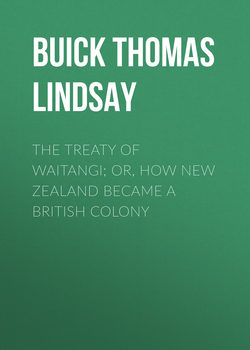The Treaty of Waitangi; or, how New Zealand became a British Colony

Реклама. ООО «ЛитРес», ИНН: 7719571260.
Оглавление
Buick Thomas Lindsay. The Treaty of Waitangi; or, how New Zealand became a British Colony
Dedication
PREFACE
NOTE OF ACKNOWLEDGMENT
CHAPTER I. IN THE BEGINNING
CHAPTER II. SEEKING A WAY
CHAPTER III. FINDING A WAY
CHAPTER IV. THE MAORI MAGNA CHARTA
CHAPTER V. IN SEARCH OF SIGNATURES
CHAPTER VI. THE TREATY
APPENDIX
BIBLIOGRAPHY
Отрывок из книги
The arrival in New Zealand waters of the battleship given to the Empire by this Dominion during a grave national crisis, marks a new epoch in the life of our country, and an event so pregnant with the spirit of Imperialism seems to the author to provide an appropriate point at which to pause and retrospectively review the causes which have made possible such an innovation in our naval policy – such a milestone in our national history. The story of New Zealand's progress since 1814 has been one of splendid emulation tempered by vicissitude. There have been dark days, days of doubt, of devastation by war, but never a period when our people lost heart or renounced their national faith. No attempt has been here made to tell the whole of that story. All that I have tried to do is to get back to the beginning of things, to the birth of law and order, to the genesis of the day when we were able to say to the Mother Land, "We will build you a Dreadnought, and yet another if needs must." The Treaty of Waitangi has been frequently derided and denounced, but it was in very truth the foundation of our nationhood. When we consider what Britain would have lost in material wealth, in loyalty, in strategetical advantage; when we reflect what it would have cost to have conquered the country by force of arms, then it is that we can see in clearer perspective the wisdom of Lord Normanby's policy, the breadth of his statesmanship, and we are the better able to appreciate the triumph in diplomacy which that treaty represents.
Unfortunately the lapse of seventy-three years has robbed us of all who were actively concerned in its consummation, and equally unfortunately they have left few records behind them. There are grey-headed men and aged women alive to-day who were children at the time, but so far as I know there is only one with us now who was actually present at the signing of the treaty. Old Rahira te Hua, the daughter of one of the great Hongi's slaves, who has seen ninety-three summers pass, still carries in her weakening memory some misty recollections of that day fraught with such far-reaching consequences to both races. The opportunity for obtaining personal testimony of what happened is thus irretrievably gone. I have, therefore, had to rely for my information almost entirely upon official documents, supplemented by such fugitive memoranda as may have been left by the few concerned, who happen to have placed their opinions or impressions on record. The gathering together of this widely-scattered material, the moulding of it into a connected narrative, has had its pleasurable as well as its anxious moments, for the subject has not been without its perplexities, ambiguities, and contradictions. All of these I have sought to sift with justice and treat with perfect impartiality. Where I have met with conflicting statements it has been my endeavour to so present the position that the reader will be able to form his own conclusions, and where I have expressed my personal opinions they have only been such opinions as appeared to me to be justified by the facts of the case. Whatever impression the reading of this narrative may leave with those who peruse it, I for one cannot lay down my pen from its writing without affirming that two things appear to me to be established – that Britain has no reason to be ashamed of the manner in which she obtained the sovereignty of New Zealand, and in the light of subsequent events she has no reason to regret it. I have not attempted to arraign or to defend the various, real or alleged, breaches of the treaty committed by our Governors or Governments. That phase of the subject is necessarily so controversial in character, that to do it justice would require a volume of its own, the need for which has to some extent been obviated by the publication in 1888 of his Aureretanga, by Mr. G. W. Rusden, in which that vigorous writer deals exhaustively with at least the Maori side of the case. The Treaty of Waitangi, the first diplomatic arrangement of the kind entered into between Britain and a savage race, was a wise, politic, and humane measure, the justice of which has been vindicated with the lapse of time. In the expressive language of a native address to Lord Ranfurly, "This treaty has been rained upon by the rain, it has been exposed to the blast of the storm, but the words are still clear, they cannot be obliterated."
.....
(1) We, the hereditary chiefs and head of the tribes of the Northern parts of New Zealand, being assembled at "Waitangi" in the Bay of Islands on this 28th day of October 1835, declare the independence of our country, which is hereby constituted and declared to be an independent state, under the designation of the United tribes of New Zealand.
(2) All Sovereign powers and authority within the territories of the United tribes of New Zealand is hereby declared to reside entirely and exclusively in the hereditary chiefs and heads of the tribes in their collective capacity, who also declare that they will not permit any legislative authority separate from themselves in their collective capacity to exist, nor any function of Government to be exercised within the said territories unless by persons appointed by them and acting under the authority of laws regularly enacted by them in Congress assembled.
.....